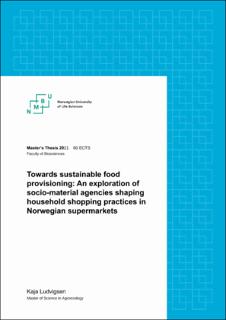| dc.description.abstract | The current agri-food system is intricate and immensely complex, with human and planetary health unravelling at an unimaginable pace. At its centre, grocery stores mediate the exchange of food items between farmers, manufacturers, suppliers, and consumers. Occupying 96% of the Norwegian grocery retail market, NorgesGruppen, Rema 1000, and Coop possess considerable power in transforming consumers' relationship to food. Therefore, working towards sustainable food provisioning will require a greater understanding of the meanings and agencies that shape household shopping practices. Using a social practice theory approach, this study investigates the ways in which nine households embody sociocultural meanings of sustainable food consumption and how that interacts with the materiality of food provisioning. Through semi-structured interviews, shopping logs and photovoice, the participants' accounts of navigating Norwegian supermarkets exemplify the highly moralized and contested landscape in which food choices are negotiated. The study found that sustainable food values, shaped by beliefs and attitudes, are informed by a myriad of direct experiences and discourse. In sourcing sustainable food items, the participants' practice of grocery shopping is contingent on stores supplying a variety of local, seasonal, organic, or package-free items. Furthermore, it requires households to be knowledgeable, skilled, reflective, and efficient in navigating strategically designed stores that primarily promote the consumption of meat and processed food items. This study suggests that, for sustainable food consumption to become an everyday practice, households require equal access to a variety of sustainable food items that are affordable, visible, and marketed. From a policy standpoint, efforts should go towards creating a sociocultural environment that encourages participatory learning, community engagement and environmental sensitivity towards our living Earth. | en_US |

